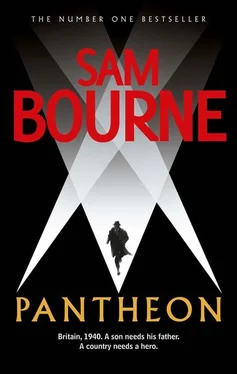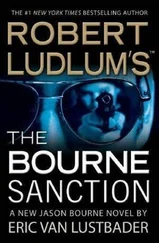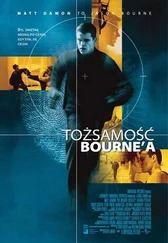Sam Bourne - Pantheon
Здесь есть возможность читать онлайн «Sam Bourne - Pantheon» — ознакомительный отрывок электронной книги совершенно бесплатно, а после прочтения отрывка купить полную версию. В некоторых случаях можно слушать аудио, скачать через торрент в формате fb2 и присутствует краткое содержание. Жанр: Триллер, на английском языке. Описание произведения, (предисловие) а так же отзывы посетителей доступны на портале библиотеки ЛибКат.
- Название:Pantheon
- Автор:
- Жанр:
- Год:неизвестен
- ISBN:нет данных
- Рейтинг книги:3 / 5. Голосов: 1
-
Избранное:Добавить в избранное
- Отзывы:
-
Ваша оценка:
- 60
- 1
- 2
- 3
- 4
- 5
Pantheon: краткое содержание, описание и аннотация
Предлагаем к чтению аннотацию, описание, краткое содержание или предисловие (зависит от того, что написал сам автор книги «Pantheon»). Если вы не нашли необходимую информацию о книге — напишите в комментариях, мы постараемся отыскать её.
Pantheon — читать онлайн ознакомительный отрывок
Ниже представлен текст книги, разбитый по страницам. Система сохранения места последней прочитанной страницы, позволяет с удобством читать онлайн бесплатно книгу «Pantheon», без необходимости каждый раз заново искать на чём Вы остановились. Поставьте закладку, и сможете в любой момент перейти на страницу, на которой закончили чтение.
Интервал:
Закладка:
Evidence of the extent to which eugenic theory ran deep in the American academy is to be found in the bizarre saga of the naked ‘posture photographs’. Two scholars did indeed dream of compiling an Atlas of Men and an Atlas of Women and, to that end, persuaded several Ivy League colleges to trick their undergraduates into posing nude, with pins taped to their back. The full story was revealed in ‘The Great Ivy League Nude Posture Photo Scandal’ by Ron Rosenbaum, published in the New York Times magazine in January 1995: the phrase ‘physique equals destiny’, uttered by Dr Curtis, should properly be credited to Rosenbaum. He discovered that among those snapped without clothes in this effort to establish a link between physical prowess and intellectual ability were the younger selves of the first President Bush, Hillary Clinton and Meryl Streep, along with the journalists Bob Woodward and Diane Sawyer.
The two authors of the initiative, one from Harvard, the other from Columbia, were apparently inspired by Francis Galton, a half-cousin of Charles Darwin’s, who was fascinated by questions of intelligence and inheritance, and who had earlier proposed a comprehensive photographic archive of the British population. His US heirs aimed to realize that dream in their own country, appropriating the already-existent practice of freshmen posture photographs as cover for the project.
Related was the apparently harmless practice of bussing girls from women’s colleges to Harvard, Princeton or Yale to meet boys, the experience recounted in the novel by Dorothy Lake. Again, this did actually happen and is widely thought to have had a eugenic motive, encouraging the young men and women of the educated elites to meet and to mate in what one account of the period calls ‘a kind of eugenic dating service’. The Wolf’s Head Society does exist and does have a ‘tomb’ of the kind James sees, but there is no record of it having any association with eugenics. The same is true of the Elizabethan Club.
As for the rest of the story, much of that too is borne out by the historical record. The Right Club is no figment of the imagination; it did meet at the Russian Tea Room in London, with the participation of the organizations and individuals named. My Reginald Rawls Murray is fictional, but some will detect a resemblance to Archibald Maule Ramsay, the Conservative MP and anti-Jewish agitator who did indeed pen the ditty ‘Land of Dope and Jewry’, its lyrics reproduced here exactly as he wrote them. After 1940, Ramsay spent the rest of the war behind bars, interned under Defence Regulation 18B, partly because of his involvement with a suspected spy at the US Embassy.
That man was Tyler Kent, a truly remarkable character who has much in common with the Taylor Hastings of this novel. A cipher clerk at his country’s embassy in London, he became involved with the Right Club and was eventually entrusted with its membership list, kept in a leather-bound, lockable red book — which can now be read in full in The Red Book: The Membership List of The Right Club edited by Robin Saikia.
The young American removed from the embassy multiple secret documents, including the clandestine correspondence between Franklin D Roosevelt and Winston Churchill. He passed those papers onto Ramsay, apparently in the hope that they would reach isolationist US politicians bent on thwarting FDR’s march to war. Scholars agree that had those letters to Churchill become public, Roosevelt may well have been wounded beyond recovery. In the event, they fell into the hands of German intelligence. The extracts appear here exactly as they were written. The full exchanges can be read in Churchill amp; Roosevelt: The Complete Correspondence, Volume 1, Alliance Emerging, October 1933-November 1942, edited with commentary by Warren F Kimball.
Kent was eventually exposed. When the authorities raided his home, they found nearly two thousand stolen documents as well as the keys to the US Embassy cipher room. He was tried and sentenced and, like Ramsay, served out the rest of the war in prison. Later he resurfaced in the United States, as the publisher of a newspaper identified with the Ku Klux Klan. He is said to have died a pauper in a Texas trailer park in 1988.
The American milieu in which James Zennor finds himself in late July 1940 is, I hope, also faithful to the facts. At that time the United States in general, and the Yale campus in particular, were riven by debate over US involvement in the war. The university chaplain, the Reverend Sidney Lovett, was a pacifist; others were strongly in favour of coming to Britain’s aid.
In Washington, there certainly were senior politicians aiming to discredit Roosevelt, both to sabotage his re-election in November 1940 and to thwart his advocacy of military action. Hans Thomsen, the then Charge d’Affaires at the German Embassy, actively sought to influence US domestic politics, backing vocal isolationists and even covertly paying for newspaper advertisements making the case against war.
It is also well-documented that the Chicago Tribune was the leading mouthpiece of the America First movement, formally launched in September 1940, while Time magazine under its campaigning editor Henry Luce, was a loud advocate for US intervention.
The novel’s earlier action is also grounded in fact. Barcelona did indeed host an alternative Olympic Games, the People’s Olympiad, in 1936 on the eve of the Spanish Civil War. The battles I refer to during that conflict are anything but fictitious, with James Zennor’s war experience tallying in part with that of the real-life Esmond Romilly, in whose story I was educated by the excellent Rebel: The Short Life of Esmond Romilly by Kevin Ingram.
Preston McAndrew is entirely fictitious and based on no one. And yet his notion of war as a cleansing fire is, I believe, no more than the idea of eugenics taken to its logical conclusion — an idea that was utterly mainstream in the pre-war period. Painful though it is to admit, a veritable pantheon of British and American intellectual heroes believed in a theory that today would make most of us shudder.
Three generations on, we take pride in the belief that the Second World War was fought out of moral revulsion at the ideas embodied by the Nazis. The awkward truth, however, is that intellectuals on both sides of the Atlantic were deeply in thrall to a set of principles we would now regard as horribly close to Nazism. This fact, one of the last great secrets of the Anglo-American elite, has lay buried for more than seventy years. It may be time to exhume it and give it proper examination.
Интервал:
Закладка:
Похожие книги на «Pantheon»
Представляем Вашему вниманию похожие книги на «Pantheon» списком для выбора. Мы отобрали схожую по названию и смыслу литературу в надежде предоставить читателям больше вариантов отыскать новые, интересные, ещё непрочитанные произведения.
Обсуждение, отзывы о книге «Pantheon» и просто собственные мнения читателей. Оставьте ваши комментарии, напишите, что Вы думаете о произведении, его смысле или главных героях. Укажите что конкретно понравилось, а что нет, и почему Вы так считаете.












